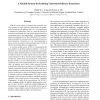Free Online Productivity Tools
i2Speak
i2Symbol
i2OCR
iTex2Img
iWeb2Print
iWeb2Shot
i2Type
iPdf2Split
iPdf2Merge
i2Bopomofo
i2Arabic
i2Style
i2Image
i2PDF
iLatex2Rtf
Sci2ools
111
click to vote
ACSAC
2006
IEEE
2006
IEEE
A Module System for Isolating Untrusted Software Extensions
With the recent advent of dynamically extensible software systems, in which software extensions may be dynamically loaded into the address space of a core application to augment its capabilities, there is a growing interest in protection mechanisms that can isolate untrusted software components from a host application. Existing languagebased environments such as the JVM and the CLI achieves software isolation by an interposition mechanism known as stack inspection. Expressive as it is, stack inspection is known to lack declarative characterization and is brittle in the face of evolving software configurations. A run-time module system, ISOMOD, is proposed for the Java platform to facilitate software isolation. A core application may create namespaces dynamically and impose arbitrary name visibility policies to control whether a name is visible, to whom it is visible, and in what way it can be accessed. Because ISOMOD exercises name visibility control at load time, loaded code runs at...
Related Content
| Added | 10 Jun 2010 |
| Updated | 10 Jun 2010 |
| Type | Conference |
| Year | 2006 |
| Where | ACSAC |
| Authors | Philip W. L. Fong, Simon A. Orr |
Comments (0)

